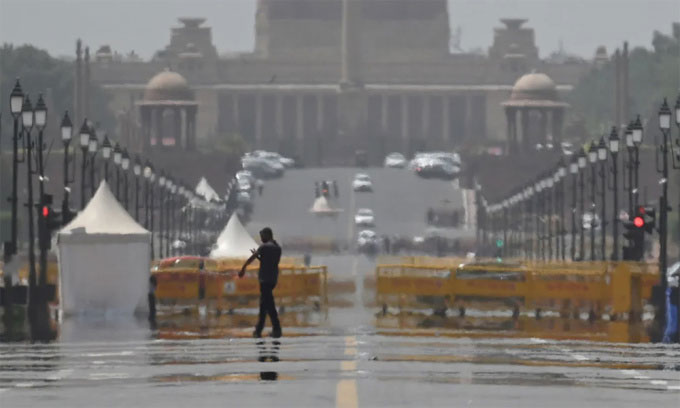Summer 2023 is the hottest in the past 2,000 years
With tree ring data in the Northern Hemisphere, experts estimate global temperatures since the 1st century and find the summer of 2023 is record hot .
2023 is the hottest year globally since 1850, when temperature records began. However, new research published in the journal Nature on May 14 also shows that human-caused climate change has pushed the summer temperature of 2023 in the Northern Hemisphere to its highest level in the past 2,000 years. last year.

A mirage appeared on Kartavya Road in New Delhi, India, due to intense heat in April 2023. (Photo: Raj K Raj/Hindustan Times).
"We shouldn't be surprised. To me, it's just a continuation of what we started by releasing greenhouse gases that cause global warming ," said Jan Esper, lead author of the study, said climate professor at Germany's Johannes Gutenberg University.
Trees provide a snapshot of past climate because they are sensitive to changes in rainfall and temperature. This information is stored in the tree's growth rings: In warm, wet years, tree rings are wider than in cold, dry years.
The team used tree-ring data from locations across the Northern Hemisphere to estimate global temperatures from the 1st century to 1850, before the advent of modern observational tools. According to scientists' conservative estimates, 2023 is at least 0.5 degrees Celsius hotter than the hottest summer in the Northern Hemisphere during that period, the summer of 2023. If we estimate generously, the difference Deviation even up to 1.19 degrees Celsius.
Study co-author Max Torbenson said that 25 of the past 28 years have exceeded the highest temperature in the summer of 246. Meanwhile, the coolest summer in the past 2,000 years was nearly 4 degrees Celsius lower than with summer temperatures in 2023 in the Northern Hemisphere due to a major volcanic eruption.
Volcanic activity could also bring cooler conditions in the future, scientists say , but ultimately, human emissions of greenhouse gases will continue to trap heat in the atmosphere. A volcanic eruption in 1991 helped mitigate the impact of El Nino - a weather system that warms the Pacific Ocean and could make the world hotter - in 1992. After the effect subsided, temperatures rebounded. spiked in 1998. New research says this is one of the hottest summers after the summers of 2023 and 2016 - two years with El Nino.
The only way to curb rising temperatures is to immediately start reducing emissions, Esper said . "The longer we wait, the more difficult and expensive this will be ," he said.
- 12 hottest things in the universe
- Another month became the hottest month globally, setting an unprecedented record
- The hottest earth in 2,000 years
- 2011 - one of the ten hottest years
- Japanese earthquake victims face summer nightmares
- Why is the hottest place not the equator?
- July 2015 is the hottest month in 200 years
- The Arctic Sea is the hottest 2,000 years
- Summer temperatures will continue to be higher in the next 50 years
- November is the hottest in 134 years
- Earth experienced the hottest June in more than 130 years
- Dangerous heat dome effect in harsh summer in America
 Is the magnetic North Pole shift dangerous to humanity?
Is the magnetic North Pole shift dangerous to humanity? Washington legalizes the recycling of human bodies into fertilizer
Washington legalizes the recycling of human bodies into fertilizer Lightning stone - the mysterious guest
Lightning stone - the mysterious guest Stunned by the mysterious sunset, strange appearance
Stunned by the mysterious sunset, strange appearance